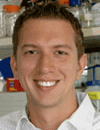|
Microarrays and Chips for Single Cell Analysis |
| |
09:30 |  | Keynote Presentation Microfabricated Cell-Culture Platforms to Study Cell Function and Drug Response in Engineered 2D and 3D Microenvironments
Marcus Textor, Professor, ETH Zurich, Switzerland
The presentation covers recent progress in developing novel polymeric substrates that provide engineered microenvironments for culturing single cells or clusters and are capable of interrogating the effect of dimensionality, shape, substrate stiffness and ECM interaction on cell function in vitro. |
|
10:00 | Tips for Success in Single Cell Studies: Novel Tip-Based Lithography Applications for Co-Culture, Cell Polarisation and Toxicology
John Collins, Senior Applications Scientist, NanoInk Inc, United States of America
Novel methods and materials are presented for the micro and nano fabrication of cellular microenvironments. We present the application of this in studies of single cell toxicology, polarisation, migration, differentiation and indivual co-culture. |
10:30 | Coffee Break and Networking in the Exhibition Hall |
|
Label-Free Routes to Single Cell Analysis |
| |
11:15 | How to Use Microbial Community Dynamics as Biosensor for the State of Natural Environments
Susann Mueller, Group Leader, Helmholtz Centre of Environmental Research, Germany
Flow cytometric analysis of natural communities dynamics and abiotic data sets were correlated using the Spearmans’ rank order correlation coefficient. Certain clusters of cells were affiliated to certain functions in the natural system. |
11:45 | Measuring the Viscous and Elastic Properties of Single Cells Using Video Particle Tracking
Manlio Tassieri, Research Fellow, University of Glasgow, United Kingdom
We present a simple and non-invasive experimental procedure to measure the linear viscoelastic properties of cells. The insights gained from the proposed methodology could prove to be a valuable addition to studies that address cellular physiology and pathology. |
12:15 | Lunch and Networking in the Exhibition Hall |
13:30 | Poster Session |
|
Single Cell Analysis in Genetic Disorders |
| |
14:15 |  | Keynote Presentation Investigating Genome Evolution in Breast Cancer by Single-Cell Sequencing
Nicholas Navin, Assistant Professor, University of Texas MD Anderson Cancer Center, United States of America
We have developed a method called Single-Nucleus-Sequencing (SNS) to profile genomic copy number in individual tumor cells. By profiling 100 single cells in two breast tumors we have delineated clonal substructure and made inferences on patterns of genomic evolution. |
|
14:45 | Single Cell Proteomics and Circulating Tumour Cells
David Klug, Co-Founder/Professor, Imperial College London, United Kingdom
For patients with metastatic cancer, Circulating Tumour Cells (CTCs) are known to be prognostic of patient survival. Although there are as yet no reliable markers associated with CTCs besides CTC number itself, there is a consensus that nucleaic acid, metabolite and protein analysis of CTCs are likely to yield a range of useful biomarkers of various kinds. CTCs are typically present in very small numbers, as few as one in a 7.5ml blood sample, and therefore reliable analysis of CTCs is a significant challenge. I present our progress on a platform technology designed to allow the analysis of copy number of cytosolic proteins at the single cell level without recourse to labeling methods such as GFP tagging. It is shown that the platform has both the sensitivity and precision to follow cell to cell variations. I also explain how the platform can in principle be adapted for the analysis of protein-protein interactions and potentially post translational modifications such as phosophorylation and mRNA copy number. Despite this encouraging progress some technical challenges remain and will also be discussed during the presentation. |
15:15 | Coffee Break and Networking in the Exhibition Hall |
16:00 | Single Molecule Mechanical Sequencing of DNA
David Bensimon, Research Director, Ecole Normale Superieure, France
I will present a novel method for DNA sequencing based on the mechanical opening and closing of DNA hairpins and the detection of roadblocks to rehybridization due to the presence in solution of complementary fragments. |
|
Microfluidics and Single Cell Analysis |
| |
16:30 | An Optically Transparent Silicon CMOS Lab-On-A-Chip Technology Platform for Single Cell Analysis
Paul Holland, Lecturer, Swansea University, United Kingdom
We demonstrate a new silicon CMOS compatible Lab-On-A-Chip technology platform with optically transparent windows through the silicon wafer. This platform will facilitate single cell sorting and biological investigation using advanced analytical techniques such as AFM and epi-fluorescence microscopy. |
17:00 | Detecting and Sorting of Difference in Deformability of Single Cell Flowing in a Microchannel
Kazuyoshi Nakabe, Professor, Kyoto University, Japan
Effective methods to detect a difference in the deformability of red blood cell and sort the cells into two destinations are proposed and applied in micro-fluidic experiments using two types of electrodes carefully designed and mounted on a microchannel surface. |
17:30 | Combination of Rolling Circle-Enhanced Enzyme Activity Detection with Droplet Generating Microfluidics for Detection of Single Enzymatic Events in Rare- or Single Cells.
Birgitta Knudsen, Associate Professor, University of Aarhus, Denmark
By combining a rolling circle-enhanced enzyme activity detection (REEAD) assay with a droplet generating microfluidic device we have developed a system for the detection of rare, aberrant cells in a population of wild-type human cells. Moreover, the integrated system allows multiplexed detection of individual enzymatic events at the single cell level. |
18:00 | Drinks Reception |


